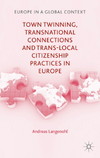Smalltown Transnationals
Twin Towns and Active Citizenship in a Globalizing Europe
Abstract
The project is dedicated to a sociological analysis of town twinning activities in Europe and their share in the imaginary project of the European Union. Ever since the 1950s, politicians and political analysts have attributed town twinning paramount political significance in regard to anchoring the project of European integration in the political socio-culture of citizens in Europe. For instance, town twinning has been seen as advocating the work of reconciling former arch-enemies like France and Germany after WW2, as suggesting a civic foreign policy “from below” as alternative to the official diplomacy during the East-West divide, and more recently as challenging mutual stereotypes and fostering mutual understanding among the peoples of Europe. Today, the European project of “active citizenship” is being reformulated under the impression of political, economic and cultural forces termed “global”.
However, and notwithstanding the high hopes placed in them, the political significance and socio-cultural implications of twin town cooperation have hardly been made the subject of an empirical analysis. The proposed book fills this gap. Proceeding from ethnographic and discourse-analytical methods within a practice-theoretical framework, it addresses the implied understandings of European integration and Europeanness that emerge from the concrete social practices involved in putting twin town cooperation to work. The underlying theoretical-methodological idea is that socio-cultural understandings of Europe are not necessarily the result of deliberate political or intellectual constructions but emerge from social practices that they inform and at the same time are abstracted from. From this point of view, “globalization” does not so much appear as a process that forces a European identity into the open, but rather informs civic practices as they merge into identities.
The project traces such practices within networks of twin towns spreading out between Austria, Belgium, France, Germany, Hungary, Italy, Spain, the UK, and the US. Additionally the project suggests to explore transnationality where it has been rarely observed, namely among small town populations. On the basis of participant observations and document analysis, and on the occasion of the transnational events organized by the twin town committees in the partner towns, it explores the political and cultural significance of joint workshops and excursions, cultural events, mutual visits, and friendships. At stake are the understandings of Europe as they materialize on the occasion of jointly organized cultural events in which nationalized culture fuses with a celebration of internationality; collective learning processes and their self-reflection on workshops concerning European themes like, for instance, the integration of migrant minorities; social and cultural economies emanating from practices of circulating people, goods, and ideas between the partner towns; the logic of the gift and the counter-gift as a relation informing the transnational social space between twin towns; and attempts to make sense of aspects of globalization like migration processes and political challenges originating outside of Europe.
Publication

Andreas Langenohl: Town Twinning, Transnational Connections, and Trans-local Citizenship Practices in Europe. Basingstoke: Palgrave Macmillan, 2015. (Europe in a Global Context, 4)